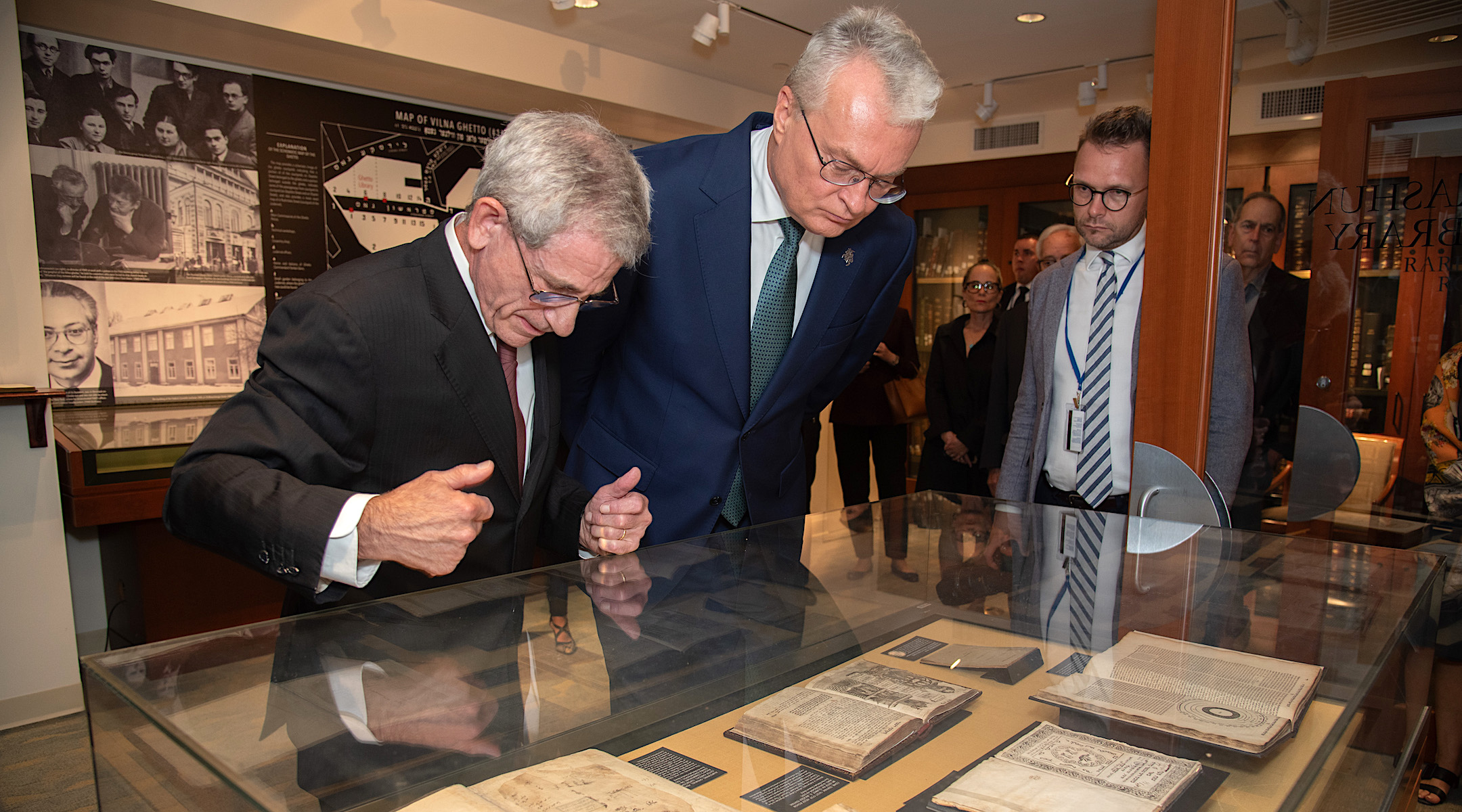In New York, Lithuania’s president honors those who saved Jewish artifacts during and after the Holocaust
At the heart of YIVO’s collection of 25 million items are books and documents saved in the Vilna Ghetto

Jonathan Brent, executive director and CEO of YIVO, and Gitanas Nausėda, president of Lithuania, examine holdings in the Strashun Rare Books Room at YIVO’s New York headquarters, Sept. 18, 2023. The room is named for a Jewish scholar in Vilna (now Vilnius) who collected nearly 7,000 volumes of Yiddish and other books before his death in 1885. (YIVO/ Melanie Einzig)
(JTA) — The YIVO Institute for Jewish Research welcomed Lithuania’s president to its Manhattan headquarters Monday to honor the Jews who rescued rare books and documents from the Vilna Ghetto and the non-Jewish Lithuanian librarian who protected the same material from destruction by the Soviets.
Lithuanian President Gitanas Nausėda was the guest of honor at a small ceremony unveiling two plaques in YIVO’s Strashun Rare Book Room.
The first plaque recalls the Jewish slave laborers, led by Avrom Sutzkever and Shmerke Kaczerginski, who in 1942 and 1943 defied the Nazis’ orders and protected a trove of Jewish documents and artifacts that the Germans had intended to house in a museum dedicated to the “exterminated race.”
The second plaque honors Antanas Ulpis, then director of the Lithuanian National Book Chamber, who in 1948 hid the archival material from the Soviets, who also intended to seize and likely destroy them.
The materials saved by the Jewish “Paper Brigade” and Ulpis form the heart of YIVO’s collection of some 25,000 materials — rare books, diaries, maps, photographs and films — documenting the extent of Yiddish civilization prior and during the Holocaust.
“These acts [of rescue] are without any doubt unique examples of universal human principles to fight the evil, to fight the darkness with every bit of light,” Nausėda said in prepared remarks. “We say we must remember, we must never forget.”
Monday’s ceremony also marked a decade or more of cooperation between YIVO and Lithuania, who in the years after the war argued over the fate of the Jewish materials that remained in Lithuanian hands after YIVO was relocated to New York. Current YIVO executive director and CEO Jonathan Brent helped broker a deal in 2011 that reestablished YIVO’s presence in Vilna (now Vilnius), and in 2015, YIVO and the Lithuanian Central State Archives began a joint project to digitize the documents as part of what is now called the Edward Blank YIVO Vilna Collections project. Completed in 2022, it unites YIVO’s prewar collections online.
Blank, a telemarketing pioneer and philanthropist, attended the ceremony along with YIVO board chair Ruth Levine and other YIVO staff and supporters and Lithuanian officials.
YIVO also announced an award to be given in Ulpis’ honor to a Lithuanian who has worked to protect Jewish culture, and that the institute is working with the National Library of Lithuania and other institutions to commemorate YIVO’s 100th anniversary in 2025.
“It’s definitely a partnership,” Brent told the Jewish Telgraphic Agency after the ceremony. “It’s not one-sided. They genuinely understand, as President Nausėda indicated, that our histories are not just interconnected, but it’s part of a single history.”
This month marks the 80th anniversary of the liquidation of the Vilna Ghetto. Before Soviet troops reoccupied Lithuania in the summer of 1944, the Germans had murdered about 90% of Lithuanian Jews.
This article originally appeared on JTA.org.













